
My notes for Spiel 2021 began before I even joined the queue. As my friend Bryan and I walked from the subway station towards the vanishing point of that long line, I observed with some concern the high percentage of people with rolling bags. My preparations for Essen were, in retrospect, spare to the point of absurdity. I had barely consulted so much as a cursory list of game releases or booth locations and hadn’t kept track of which vendors were going to be in attendance. The first indication that this approach may not have served me well was realizing, Oh God, I’m going to have to carry everything.
As the line moved briskly forward, I drummed my hands on Bryan’s back, a squirrel burying an acorn while repeating the words “We’re here, we’re here!” Essen Spiel 2021 was my first board game convention since 2015, and my first opportunity to get completely lost in the hobby as part of an anonymous collective. The prospect of stepping through those doors and spending two whole days talking about and thinking about nothing but board games was intoxicating. Granted, I talk and think about little but board games most of the time; the social permission to do so was the source of my high.
Given that a number of new releases and difficult-to-find games were available from various publishers in limited quantities, the first few hours were a feeding frenzy. I went in wanting two games: Ultimate Railroads, the new Big Box edition of Russian Railroads, and Mille Fiori, a new design from Reiner Knizia. Railroads seemed more likely to sell out and had been on my radar for longer—I sold my copy of the base game when the new edition was announced back at the beginning of the year—so we made a disorganized push to find the hall where German publisher Hans-im-Glück was located. Blitzing through the halls, I began to compile a mental list of booths to visit and games to return to. By the end of Hall 3, where Hans-im-Glück had two separate booth locations, I was overwhelmed by the number of places I wanted to return to. The speed with which we passed by each location had an effect similar to subliminal messaging, the brief glimpses of the Mindclash sign and the Bitoku standee analogous to a single frame of a dancing hotdog spliced into the middle of a trailer for Kramer vs. Kramer.
As expected, I was by no means the only attendee interested in hauling around a 6-pound box for the rest of the day. At roughly 10:30 in the morning, only half an hour after the convention began, the line of people anxious to pick up their copies of Ultimate Railroads, Paleo, and the anniversary edition of Carcassonne was about 30 long. The gentleman in front of me was already laden with an IKEA-sized bag full of games. Clearly I was behind.
The line moved slowly, so I left Bryan to do DuoLingo while I looked for a floor plan. I could see any number of conventioneers walking around with them, and I was not eager to repeat the Hans-im-Glück experience with the eight or nine publishers I needed to track down on behalf of Meeple Mountain. I made my way through what remained of that gentle labyrinth until I found the main entrance, where I told the docent in frazzled German that “I would like to visit a guide.” She shrugged a great, indifferent shrug and responded in English, “Yeah, we have only one and need it for ourselves.” Fair enough.
I want to take a moment to appreciate just how large the convention center is. Messe Essen GmbH consists of eight numbered halls and a central Galleria serving as an aorta between halls 1–6. Each of these halls has the proportions of an airport hanger, with total area running to about 1.2 million square feet. This is a number so large that it ceases to have meaning. To put it in other terms, 25 football fields could be tucked into Messe Essen without anyone worrying about space. You could easily lay 600,000 Twilight Imperium boxes, 923,076 copies of Gloomhaven, or 60,000,000 Pack O Game editions of Orc end-to-end within the floor plan of Messe Essen. As a longtime New York City resident, contemplating this kind of square footage elicits a bodily response.
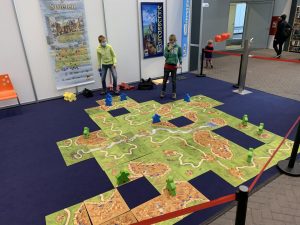
Returning to the line resigned to the knowledge that we would have to familiarize ourselves with our surroundings by actually paying attention to them, I settled in for what would prove to be a 45 minute wait. I didn’t mind, given how hectic the initial 30 or so minutes of the convention had already proven to be, and standing in line was an excellent opportunity to make some observations.
Observation #1: Possibly the largest ratio of pirate hats to people that I’ve experienced since attending the Charleston Pirate Weekend back in 1995. I still don’t fully understand this.
Observation #2: Attendees were significantly less male than I had expected. While there were definitely more men than women, I would tell you that the distribution approached the horizon of gender parity. This was reflected in the convention itself; I saw very little, even in the small booths at the farthest corners of Hall 6, that thrived off of objectification and titillation. Several hours later I would come across a booth right at the entrance to Hall 1 manned by two Sexy Nurses, but I take it as a positive that their presence was jarring. I’ll be attending Pax Unplugged in December, and I’m curious to see how the gender distribution of American conventions compares. It’s been a while.
Observation #3: Amongst the early purchases he had stashed in his IKEA-sized bag, the Norwegian in front of me had two copies of Solitaria, the new single-player expansion for Concordia. I had no idea this was going to be on offer at Spiel and it was immediately added to my list.
Observation #4: Boy, what a white hobby, huh?
Of course some of this has to do with the ethnographic realities of Germany, a country that, while rapidly diversifying, remains stubbornly pale, but there were people in that convention hall from all over the world and I don’t think I saw more than 10 people of color over the two days I was there. This is, quite simply, a failure. There’s no other way to put it. The board game community is nowhere near as hermetic as it used to be, but we have a lot of work to do if we want the hobby to be welcoming to everyone.
The good news on this front is that there is absolutely evidence of that work being done. The aforementioned Paleo, recent winner of the Kennerspiel des Jahres, was roundly and rightly criticized upon release for its artwork. Despite taking place before the existence of white people, the artwork featured humans who were almost entirely, if not exclusively, white. The first expansion, which it feels safe to assume will be called Paleo: A New Beginning in English, made its debut at Spiel 2021, and I noticed right away that the cards feature a diverse cast of characters. This is heartening. The hobby can only be enriched by inviting more people in. As silly as it may seem to some who have gone their entire lives seeing themselves depicted everywhere, diversifying the art in Paleo is important.
With Railroads safely in hand, the tempo was able to relax. Bryan had wandered over to the booth for The Detective Society, a series of UK-published escape room games premised on solving police cases, and arranged for us to do their demo. The pitch was wonderful; we sat down and a woman ran over, slamming a box down on the table as she said, “There’s been a murder at the convention. Not surprising, the world of board games is a sordid one.”
The Detective Society distinguishes itself from most of its ilk by making impressive use of communication technologies. That ten-minute demo alone involved two fully-functional websites for non-existent companies, a personal assistant you had to text, an email address with which you had an actual back-and-forth, and a number that had to be called. I started to wonder if the full game involves an intern who’s on standby 24 hours a day to answer video calls in character.
There were a few technical issues that came up during the demo, but the team were a joy. “It’s almost as if,” one employee said when we told him we were having difficulty with calling the UK phone number, “the person in charge of making these sheets,” clearly implicating himself, “didn’t think about the fact that most of the people at this convention wouldn’t be calling from UK phones.”
We ambled from booth to booth, getting lost in the massive hall that played home to AEG, Schmidt Spiele, Pegasus Spiele, and all the other other big ducks in the pond who now found themselves even bigger ducks than usual given the absence of the biggest duck. Asmodee, the largest board game publishing company in the world, announced back in June that they would be skipping Spiel 2021 in favor of focusing on virtual events for the time being. Their absence didn’t come up outside of one publisher’s comment that “Asmodee is usually this entire hall. And I do mean the entire hall. When they announced they weren’t attending this year, I jumped on the phone immediately to make [our location near the main entrance] happen.” Having never experienced a Spiel with Asmodee in attendance, the lack of any one publisher fully dominating the space was pretty pleasant.
We joined two older and delightfully ornery Nederlanders in the AEG play area for a demo of Whirling Witchcraft, which sees players trying to overwhelm their opponents with potion ingredients while simultaneously attempting to keep their own stocks low. One of our two tablemates seemed to not fully understand the point of the game, trying instead to starve his countryman of any ingredients at all. “If you don’t cook, how am I supposed to eat???,” the frazzled man yelled in English.
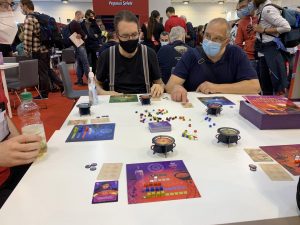
Whirling Witchcraft is an absolute blast, and I likely would have bought a copy had it been 10 Euros cheaper and half as large. I had already snagged enough small games in the hour post-Railroads that my Hans-im-Glück bag was starting to carry a paunch, and after picking up a few titles to review from the lovely people at Helvetiq, the situation was approaching the untenable.
In one of the smarter business decisions I’ve ever seen, a freight company sets up an annual booth at Spiel to handle shipping for those who can’t bring their games home with them. The rates were pretty good, much better than what I had paid La Poste in France the week before to ship a chunky box of comic books home. Since the price tiers were in 5 kg intervals, and my current haul was sitting at about 10.5, I decided to dive into the used game booths that littered the convention floor before shipping a box home. If you’re going to pay for 15 kilos, you might as well ship 15 kilos.
For an American, those used booths are a marvel. Games that are either impossible to track down or prohibitively expensive in the United States can be found for a song in Germany, the land of board game milk and board game honey. Reiner Knizia’s Keltis, for example, will reliably set you back $45 on eBay. I bought my copy for $10. So evident was my excitement at the sight of all these old and elusive Knizia games, so bright was the light that shone in mine eyes, that upon the completion of my transaction the young man working the booth held his arms out wide and boomed, in English, “Welcome to Germany!”
I did restrain myself, only picking up three games, but by this point my pile was obscene. A hasty last-minute addition of Siege of Runedar, another hotly anticipated title that I didn’t realize would be available at the convention, moved things at last firmly into the realm of the untenable. A quick check to confirm that the Schmidt Spiele booth was sold out of Mille Fiori—Hans-im-Glück’s seemingly endless supply of Ultimate Railroads would haunt me for the remaining day and a half—and it was time to ship the first box home.
I’m still not entirely sure how I managed to carry that entire stack across the convention floor, nearly two-dozen games tucked under my arms like some sort of manic gremlin. Bryan, whose sole purchase fit easily in his left pocket, looked significantly more dignified. I am not exaggerating when I say that people commented as I passed. Bryan overheard one woman say “Oh my god,” and the “Welcome to Germany!” guy burst out laughing as I scurried by. “Don’t look at me,” I shouted over my shoulder.
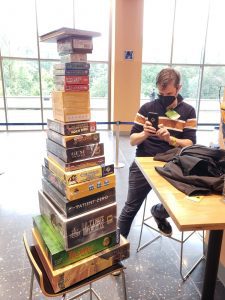
I spent a fair amount of time at the shipping booth over the two days, and saw all variety of packages and destinations. I saw a quiet Japanese man ship a 23 kg box to Nagasaki for about as much as I paid for my plane tickets. I heard an employee patiently explain that one couple’s 33 kg box would need to be split into two for safety. I watched a group of four friends from the Czech Republic pack up a box with all of their communal loot, and I smiled thinking about the game nights they would have back home. As much as I felt like I had gone all-out in my purchases, 5 minutes of observation at the shipping booth made it apparent that the only mistake I had made was not bringing one of those wheeled bags. They allowed for consumption with discretion.
The language dynamics of the convention were fascinating in their own right, an inevitable consequence of any large gathering in central Europe. A great deal of attendees spoke German, of course, but this was true of surprisingly few exhibitors. The larger companies had employees with various language backgrounds—the Lucky Duck tables were a UN conference in miniature—but the smaller publishers had to make do with improvisation.
The melange of languages led to some great interactions. While demoing their self-published card game, a German mother and her adult son taught Bryan “du bist daran,” the German “It’s your turn.” Bryan and I made it halfway through a conversation with a vendor in German before everyone realized that all involved were American. I served as translator between vendors and attendees a few times, and on one occasion this led to Bryan and I playing an oversized edition of dexterity game Ice Cool with a mother and her six-year-old child. The child won by an embarrassing margin and I don’t wish to discuss it any further.
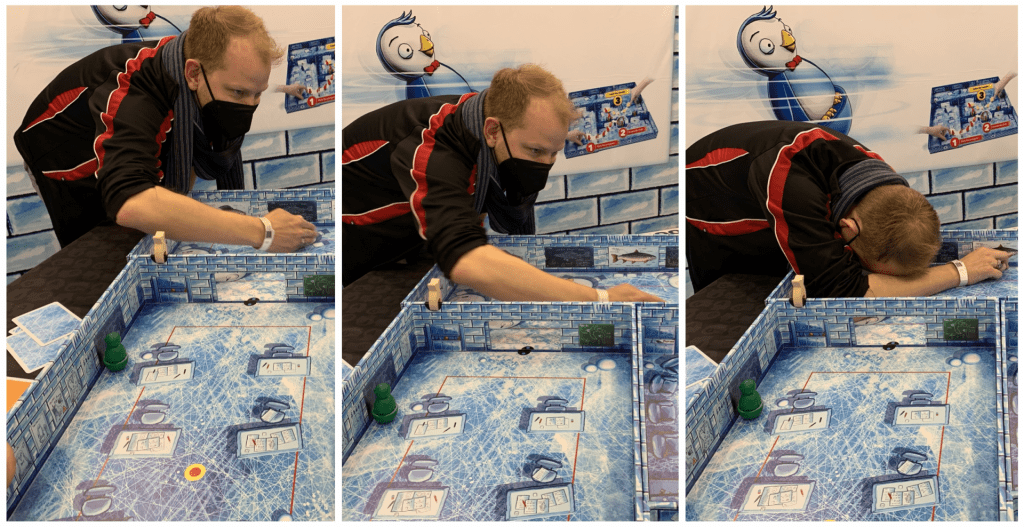
Each night at 7:00 pm, following an entire day at the convention hall, nine straight hours of walking and playing and purchasing and carrying and shipping and talking, the crowd would disperse out into the night, members of an adjourned secret society. The tell, of course, was that we were all carrying bags full of board games. The conductor checking tickets on the train from Essen to Düsseldorf leaned in and said, “Do you mind if I ask, I’ve noticed an awful lot of people with board games on this train. What’s going on with that?”
Both nights that we attended the convention, we came back to the hostel and were greeted by Aleksandra, the manager on duty. We’d buy a bottle of wine, sit down with our grocery store dinner, and play a couple of games, too exhausted to do much else. On the second night we met a fellow guest who had also been at Spiel the last two days, where he’d been pitching and play-testing a game of his own design. We spent a good hour or two in conversation about games we love, the design process, and what it’s like to pitch a game, all while playing copies of Sprawlopolis and Art Robbery that I picked up during the day. At the end of her shift, since it was our final night in Düsseldorf, Aleksandra joined us for a game.
I ended up shipping two boxes home, approximately 37 pounds of games. I picked up 21 titles over the course of those two days, yet all I could think about once everything was unpacked and filed away on the shelves was I wish I’d gotten more. A consideration of the games I picked up left me lamenting all the ones that got away, the games I would get if I could take another crack at the convention. Bitoku, Golem, Great Western Trail, Mille Fiori, Ten, Trickerion, the list goes on. Weirdly though, two weeks removed from the convention, I would struggle to tell you exactly which games I did get. They’ve already started to blend into the whole of the collection.
What I can picture very clearly is a publisher excitedly telling me about their plans for an upcoming series, and two grown men getting their asses handed to them in a dexterity game by someone whose fine-motor control hasn’t completely finished developing. I remember hearing Bryan tentatively try out du bist daran, and a fortissimo “Welcome to Germany!” echoing across the floor of the convention center. The best thing about Spiel 2021 was convening each night at that table with a supermarket salad and a couple of two-player games. No matter how many rolling bags I think to bring next year, I have to remember that the games are a means to an end.



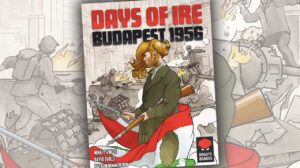

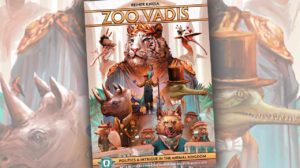





Add Comment